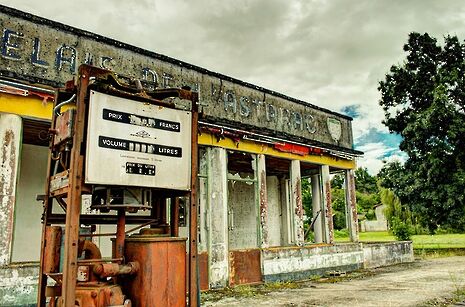A plate of poetry, please: Megabus and service stations
Jade Cuttle travels by Megabus and finds poetry at service stations

“So this is hell. I'd never have believed it. You remember all we were told about the torture-chambers, the fire and brimstone, the "burning marl." Old wives' tales! There's no need for red-hot pokers. Hell is – 18 hours Megabus."
Jean-Paul Sartre, No Exit
In any other situation, service stations would be the rock-bottom scrapings of the brilliance and beauty our country has to boast: gnawing on undercooked chips and chicken bones against a backdrop scenery of brutally bare concrete, windblown cellophane, and wafting discount flyers, half-hiding the processed fleshy mess in the crumpled caress of its brown paper bag as a stranger shouts their disgust through silent but severe glances, the blessing is bleak. In this situation, however, the service station is sacred, still drab and depressing, of course, but inviting and proud in proof that poetic beauty can be practically anywhere.
I vowed to never do it again, to save my soul from the hell that is 18-hour Megabus, to hold onto the hope of revision otherwise swiftly extinguished by the children either crying or clomping each other round the head. But for the MMLer, crawling back to Britain after the year abroad, several massive suitcases the size of shameful over-indulgence in foreign patisserie substances, and particularly with May Week partying in the pipeline, it may actually seem more appealing to save money rather than metaphorical essence. Even for the poetic mind who typically avoids practicality like the plague. Still, despite boasting fees as little as one pound plus 50p booking charge, such costs seem more like mythical creatures whose shadows are only rumoured to have once been glimpsed. Though the driver assures us that they do actually exist. He is not sure how, but apparently 2am is the key. The wi-fi and electric sockets are surprise luxuries as is the working tap, toilet, and toilet paper; only later was it learnt that the first two are solely to keep the passengers sane and prevent any protest when delay after delay piles up until half the people have missed their connecting transit and have to completely rearrange their plans. It almost sounds too good to resist, being temping enough to not be my first trip, but then I trawl through the farewell messages sent to friends during the last painful voyage and shudder.
I take no pleasure in this confession, but I am a grim human being and despite best intentions, I cannot help but make a situation worse. Thus, if I make the mental oath to travel by means other than Megabus for here on, then this is as much for the benefit of my poor companions as for my own. While I am proud to say that I was not sick, despite nausea dredging breakfast from the depths of my being with the stuffiness of broken air-con, I thought I’d be prepared and make a packed lunch – but there was only Roquefort cheese in the fridge. It is tolerable most of the time, but when detained for sixteen hours in the prison walls of a tiny plastic tub with pasta in a very warm coach, the stench of its throat-scratching potency sends more than shivers down the spine, does more than simply turn the stomach, it shovels until the stomach heaves and begs to be freed. That is when the rock-bottom scrapings of service station beauty and its bare concrete backdrop suddenly became brilliant, the fresh air and freedom, and gnawing on undercooked processed garbage, in spite of strangers’ disconcerting glances, becomes a banquet.
Before we know it, we are back on the road. Its haunting tones of tarmac are as taunting as the twilight, hovering between white and black, neither day nor night, just the endless grey, the grey that never ends. In the end I find myself paying more attention to smiling and sharing jokes with strangers; it is actually quite fun, our laughter punctuated only by the splintered sound of unfolding every now and again the brittle pile of bones that feel as fragile as twigs tied together with rubber bands. In brief, the existentialist phrase swiftly whipped out from up the sleeves at any vaguely literary cocktail party ‘Hell is other people’ is worn thin with use and sans nuance.
 Comment / Anti-trans societies won’t make women safer14 November 2025
Comment / Anti-trans societies won’t make women safer14 November 2025 News / Controversial women’s society receives over £13,000 in donations14 November 2025
News / Controversial women’s society receives over £13,000 in donations14 November 2025 News / John’s rakes in £110k in movie moolah14 November 2025
News / John’s rakes in £110k in movie moolah14 November 2025 Fashion / You smell really boring 13 November 2025
Fashion / You smell really boring 13 November 2025 Music / Three underated evensongs you need to visit14 November 2025
Music / Three underated evensongs you need to visit14 November 2025









